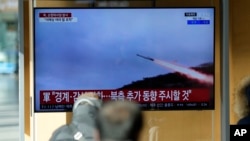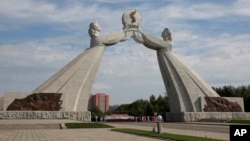The United States has called on North Korea to refrain from further destabilizing actions and to return to diplomatic engagement following North Korea's firing of several cruise missiles into the waters off its western coast earlier on Wednesday.
“We find [the actions] incredibly dangerous,” State Department Deputy Spokesperson Vedant Patel told VOA during a briefing on Wednesday, while declining to provide the U.S. assessment of North Korea’s intentions.
This latest missile launch occurred just days after Pyongyang tested a solid-fuel intermediate-range missile, equipped with a hypersonic warhead, into waters between the Korean Peninsula and Japan.
“We harbor no hostile intent toward the DPRK and continue to be open to diplomacy without preconditions,” Patel added. He was referring to the Democratic People's Republic of Korea, which is North Korea’s official name.
North Korean leader Kim Jong Un has sharply criticized South Korea, describing inter-Korean relations as a relationship between "two states hostile to each other.”
A major monument in Pyongyang symbolizing the goal of reconciliation with South Korea has been demolished, according to news reports citing satellite imagery.
Earlier this month, Kim labeled South Korea as a “primary foe and invariable principal enemy,” stating that unification with South Korea was no longer possible.
This stance is viewed by some analysts as a departure from North Korea's longstanding objective of reunifying the Korean Peninsula under its control.
Pyongyang also continues to ignore Washington's offers for dialogue and remains averse to negotiating with Seoul.
U.S. officials have said they are disappointed by North Korea’s continued rejection of dialogue and the escalation of its hostile rhetoric toward South Korea. The United States said inter-Korean cooperation is vital to achieving lasting peace on the Korean Peninsula.
“We are eager to engage in substantive discussions on identifying ways to not just manage military risk but create lasting peace on the Korean Peninsula, as well as our continued stated goal of the complete denuclearization of the Korean Peninsula,” Patel said Wednesday.
At the Pentagon, Press Secretary Major General Patrick Ryder told reporters on Tuesday that Washington has been very public in its commitment to working with allies and partners “to deter and help stabilize the security of the region.”
The U.S., Japan and South Korea have reaffirmed their commitment to the complete denuclearization of the DPRK, in accordance with relevant United Nations Security Council resolutions. The three countries also urge the DPRK to abandon its nuclear and ballistic missile programs.
North Korea last launched cruise missiles in September 2023. Two cruise missiles carrying mock nuclear warheads were fired toward the Yellow Sea at that time.
The two Koreas have been divided since the Korean War ended in 1953. They remain technically at war as the Korean War ended with a truce, not a peace treaty.
Jeff Seldin contributed to this report.





